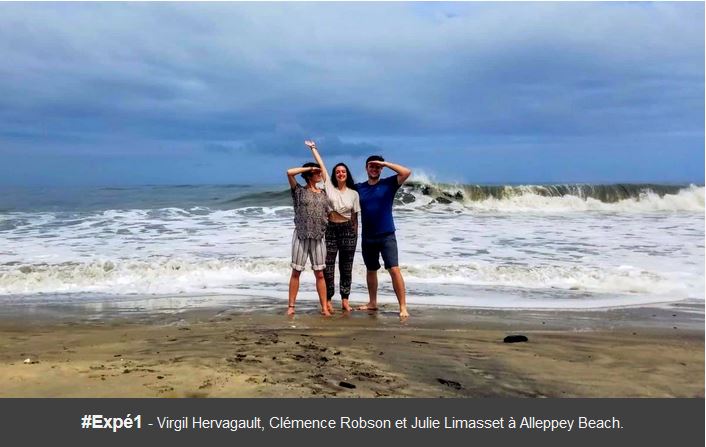Newsletter 7
Three months in Asia!
#Expé 1
The #Expé1 started its second month in India with new projects in Bangalore. A circular coconut farm, an edible tableware business and a coconut leaf straw business. Then they went to the state of Kerala to meet a farm that produces and uses compost from fishing waste in Munambham as well as Cherai where there is a public policy of private investment for aquaponics. Finally they crossed South India to get closer to Chennai, from where they will leave for Sri Lanka. In passing they stopped in Pondicherry to visit a permaculture farm.
The climate change has serious consequences on India in this month of June! Indeed a scorching heat wave has raised the thermostat to reach record temperatures in Rajasthan. More than 50°C recorded! Moreover the monsoon is several weeks late leading to an unprecedented drought in Chennai. Indeed it is the monsoon that brings nearly 70% of the annual rainfall in this area of India. As a result, the retention basins are empty and the sixth city of India must transport 525 million liters of water per day by truck … These problems prevent us from finishing our adventure with projects in Chennai. These problems prevent us from finishing our adventure with projects in Chennai. We will go there only to take the plane to Sri Lanka, a little earlier than planned. Departure on July 7th!

#Expé 2
For its third month of travel, the #Expé2 went to Thailand! More developed than its neighbors, this country is full of innovations and ideas to move towards a circular economy!
Tourism represents 10% of Thailand’s GDP. The country welcomed nearly 32 million visitors in 2016. This demographic explosion in a developing country has dramatic consequences on the environment, and on the oceans in particular. However, Thailand owes its attractiveness to its fantastic natural spaces: it has become urgent to preserve them by adopting a more sustainable consumption pattern. The islands are particularly fragile ecosystems because of difficult waste management and with fewer resources. We met with five circular economy projects related to the management of agricultural waste, waste related to tourism and the redistribution of food surpluses for the most deprived.
We are leaving Thailand for Malaysia and Singapore, where we will spend our last month of expedition!

Our favorite projects!
#Expé 1 - Evlogia
This start up was created 6 months ago by a professor from Christ University in Bangalore through the Initiatives in Creative Learning for Impact (ICLI) program, which brings together numerous student-led projects. Evlogia brings together more than 150 students from different fields of study at Christ University.
To combat plastic, they have developed straws under the name Leafy Straw, made from coconut leaves, a common agricultural waste in this region of India. Indeed, the veins and limbs that make up these leaves become dry and rigid once they fall from the coconut tree and are usually burned on farms. The students realized the method to create different sizes of straws and designed a machine that allows manual workers to work faster and more accurately.
With one coconut leaf, 600 small straws are produced. These leaves come from farms around Bangalore but also from Kerala. Evlogia offers 5 types of straws according to the type of drink.
The start up was made possible thanks to the ICLI program and the university which is very dynamic in the implementation of eco-initiatives. Another pilot project of the program consists in making sponges from another agricultural waste from the coconut tree exploitation, the coconut fibers.

#Expé 2 - Elephant Poopoopaper Park
We met a project that is original to say the least! In Chiang Mai, in the North of Thailand, many tourists flock to the animal parks to admire the Asian elephants. An adult elephant produces nearly 150kg of undigested fiber per day. The surrounding villages, which use this faeces as fertilizer, are under-capacitated and mountains of elephant dung accumulate on their doorsteps. This is how Michael and his wife Kanokrat got the idea to recuperate this fiber-rich material to make paper! But this is only part of their business: 80% of their source material comes from the agricultural waste of neighboring farmers. These farmers have no way to get rid of their vegetable waste, and every year, in April-May, a thick black smoke covers the area when all of it is burned.
By creating this original product, Poopoopaper Park does not hope to absorb all the waste which is far too numerous, but seeks to contribute to improve the living environment of the inhabitants as well as to sensitize its growing public!

Conference and Event

Quick return to France, with the organization of the awards evening by the AgroPArisTech Foundation for the projects supported this year. We are very proud to have been able to participate thanks to the presence of our President, Marc-Antoine, and part of the 2020 team already formed with Salomé and Léna!
The CirculAgronomy association
CirculAgronomie is an association created in 2016 by two AgroParisTech students as part of a gap year project. Our ambition is to link circular economy projects around the world in the fields of agriculture and food industry. We analyze their social and environmental impact and their reproducibility through the seven pillars of circular economy described by ADEME. To do so, students in gap year carry out expeditions to different countries every year. This year, we will be 5 students… in France!

Copyright CirculAgronomie 2020
